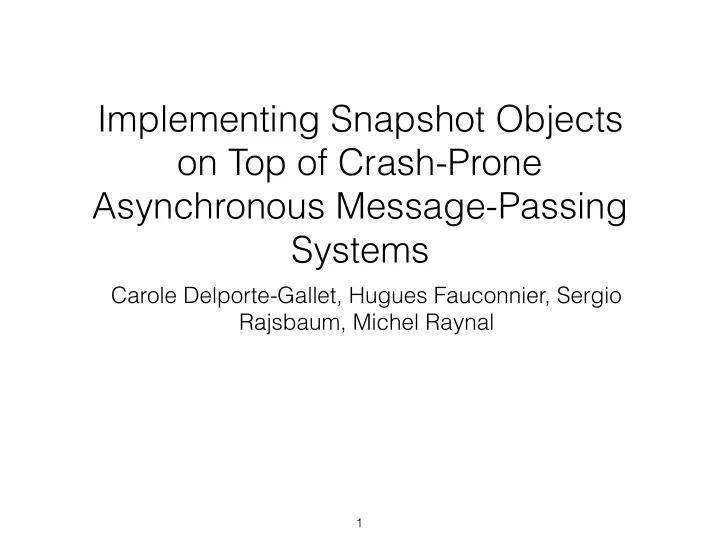

Implementing Snapshot Objects on Top of Crash-Prone Asynchronous Message-Passing Systems Carole Delporte-Gallet, Hugues Fauconnier, Sergio Rajsbaum, Michel Raynal 1
• Processes communicate by applying operations on and receiving response from shared objects • A shared objects is define by: • states • operations • sequential specification 2
Register • Operations: read, write • state: item • sequential specification: { state = y } write ( x ) { state = x } return ok { state = y } read () { state = y } return y 3
Implementation of object O • An operation on O is implemented using messages • Correctness ? 4
Implementing an object ok write(x) message passing x ok read() write(y) 5
Histories • A history is a sequence of invocation and response write 1 (1) write 2 (2) ok 1 write 1 (0) ok 2 ok 1 read 2 ()0 2 write(1) ok write(0) ok P1 ok P2 0 write(2) read() 6
write(1) ok write(0) ok P1 ok P2 0 write(2) read() 7 7 P3
write(1) ok write(0) ok P1 ok P2 0 write(2) read() 8
write(1) ok write(0) ok P1 ok P2 0 write(2) read() 9
Atomic snapshot • Goal: reading multiple locations atomically 10
• Two operations: • update(v) return ok • snapshot() return an array of n items • Sequential specification: • state: an array A of n items • update(v) by process pi writes v in A[i] • snapshot () return an array X where X[i] is the last value written by Pi 11
snapshot() snapshot() [ , ,….] ⊥ ⊥ [1,2,…..] update(1) P0 P1 update(2) 12
snapshot snapshot snapshot [ , ,…..] [1, , …. ] ⊥ ⊥ [1,2,…..] ⊥ update(1) P0 P1 Update(2) 13
One update per process • Property: all the snapshots are ordered S i ⊆ S j orS j ⊆ S i • reduced the complexity of the implementation 14
first attempt initially shared R array of atomic register init [v,…v] local to Pi array C of n items init [v,…v] Code of Pi update(w){ R.[i]write(w) return (ok) } snapshot(){ for ( int j=0; j<n; j++) C[i]:=R[i].read() return C } 15
2 1 snapshot [ ,2,….] ⊥ update(1) P0 P1 Update(2) 16
initially shared R array of atomic register init [v,…v] local to Pi array C of n items init [v,…v] Code of Pi update(w){ R.[i]write(w) return (ok) } collect(){ for ( int j=0; j<n; j++) C[i]:=R[i].read() return C } 17
• C1=collect(); C2= collect () • if C1=C2 then C2 is a snapshot ! 18
collect C1 collect C2 19
initially shared R array of atomic register init [v,…v] local to Pi array C1,C2 of n items init [v,…v] Code of Pi update(w){ R[i].write(w) return (ok) } collect(){ for ( int j=0; j<n; j++) C[i]:=R[i].read() return C } snapshot(){ C1:=collect() forever C2:=collect (); if (C1==C2) return C1 else C1:=C2 } 20
Safety : linearization points update snapshot C1 collect C1 collect C2 C1==C2 21
Liveness • If update() concurrent to collect, snapshot never terminate • Non blocking 22
implementation in message passing • implementation register with crash failures • Attiya et al. • a majority of correct process is needed and sufficient 23
end of write? what happen if only some process • local variable REG receive (write, x)? write(x) and write(y), • write(x): send (write, x) to all what is the latest ? • upon receive (write, x) REG:=x • read(): return REG 24
• local variable REG,wts,rts • write(x): wts++;send (write, x,tws) to all; wait (ok_write,ts)from a majority of processes • upon receive (write, x, t ) from p REG:=max(REG, (x,t)) send(ok_write, t) to p 25
• local variable REG,wts,rst • read(): send (read, rts) to all; wait (ok_read,v,rts) from a majority of processes; REG=max( REG, v), write(REG) • upon receive (read, t ) from p send(ok_read,REG, t) to p 26
Implementation • first registers (write 2n messages; read 4n) • second snapshot (double collect) • collect n read —> 4n 2 27
code of process i update(v) 28
29
update(reg) 30
31
32
33
Number of messages • update : 2n messages • snapshot ( good case) : 2n messages 34
wait free • helping mechanism 35
Conclusion • less messages than • implementation of registers in MP • + • implementation of snapshot in SM 36
Recommend
More recommend